
When it comes to choosing a dog, one of the first decisions any prospective dog owner must consider is size. Dogs come in all shapes and sizes, from pint-sized companions you can carry in your arms to towering guardians that take up most of the couch. Size impacts not only the dog’s physical traits but also its needs, behavior, and compatibility with your lifestyle. Let’s explore the fascinating world of dog sizes, including how the delightful and compact Bichon Frise fits into the spectrum.
Why Dog Size Matters
The size of a dog isn’t just about physical appearance. It influences everything from daily exercise requirements to dietary needs and even the space you need at home. Here are a few factors where size makes a significant difference:
- Living Space: Smaller dogs are ideal for apartments and urban living, while larger breeds need more space to roam and relax.
- Exercise Needs: Generally, larger breeds require more physical activity, though exceptions exist.
- Cost of Care: Bigger dogs often mean bigger expenses, from food to medical treatments and supplies.
- Handling: While tiny dogs are easier to carry and manage physically, larger breeds often require more training to handle their strength and energy.
- Companionship Style: Small breeds may be more prone to cuddling, while larger breeds may act as protectors or working companions.
The Spectrum of Dog Sizes
To better understand how size impacts a dog’s characteristics, let’s look at the common size categories for dogs:
Toy and Small Breeds
Small dogs are perfect for those looking for compact, low-maintenance companions. These breeds often weigh under 20 pounds and are small enough to thrive in apartments or homes with limited space.
One shining example in this category is the Bichon Frise, a fluffy, friendly, and hypoallergenic breed. The Bichon Frise typically weighs between 10 to 18 pounds, making it the ideal size for cuddling yet sturdy enough for playtime. Unlike many toy breeds, the Bichon is known for its hardy and robust personality, making it a great companion for families and singles alike.
Other notable small breeds include the Chihuahua, Pomeranian, and Miniature Dachshund. These dogs often form strong bonds with their owners and thrive on attention, though they may be prone to separation anxiety if left alone for long periods.
Medium-Sized Breeds
Medium-sized dogs often strike a perfect balance between manageability and activity. They typically weigh between 20 and 60 pounds and are well-suited for active families or those with moderate outdoor space. Breeds like the Cocker Spaniel, Australian Shepherd, and Beagle fall into this category.
While the Bichon Frise is on the smaller end of the scale, its playful and social personality aligns well with many medium-sized breeds. Owners who love the Bichon’s energy but want a slightly larger companion might consider medium-sized dogs.
Large Breeds
Large dogs, such as the Golden Retriever, Labrador Retriever, and German Shepherd, weigh between 60 to 100 pounds. These dogs are often great for families, thanks to their friendly demeanor and protective instincts. However, they require ample space and consistent training due to their size and strength.
Giant Breeds
On the extreme end of the size spectrum, giant breeds like the Great Dane, Irish Wolfhound, and Saint Bernard often weigh over 100 pounds. While their sheer size can be intimidating, these gentle giants are often surprisingly laid-back and affectionate. However, their size comes with unique challenges, including higher food costs, shorter lifespans, and the need for spacious homes.
Where the Bichon Frise Stands in the Dog Size Debate
The Bichon Frise may be a small breed, but it carries a personality that rivals even the biggest dogs. Its compact size makes it a great choice for urban dwellers, retirees, or anyone who values a low-shedding, family-friendly dog. The Bichon’s cheerful disposition and adaptability allow it to fit into various living situations, from small apartments to larger homes with backyards.
However, being a small breed also means the Bichon Frise can be prone to some size-specific challenges. These include:
- Fragility: Though sturdier than many toy breeds, small dogs can still be vulnerable to injury from rough handling or larger pets.
- Cold Sensitivity: Smaller dogs often feel the cold more acutely, making cozy blankets and warm clothing a must during winter months.
- Training Needs: Despite its intelligence, the Bichon can sometimes have a stubborn streak, especially when it comes to house training. Consistency is key!
Choosing the Right Size for Your Lifestyle
When deciding on the size of your next canine companion, here are a few questions to consider:
- How much space do you have at home?
- How active is your lifestyle, and can you meet the dog’s exercise needs?
- Are you prepared for the financial commitment of a larger dog?
- Do you prefer a lap-sized companion or an energetic jogging partner?
By understanding the unique characteristics of dogs across different size categories, you’ll be better equipped to find the perfect match for your lifestyle.
A Name That Fits
Once you’ve decided on your new furry friend, don’t forget to choose a name that matches their personality and size. For small breeds like the Bichon Frise, names like “Coco” or “Pixie” highlight their playful and sweet nature.
Final Thoughts
Dogs come in all sizes, and each category offers unique joys and challenges. Whether you’re drawn to the charm of a small Bichon Frise or the majestic presence of a giant Saint Bernard, understanding the differences in size is key to finding your perfect match. No matter their size, one thing is certain—dogs bring endless love and companionship into our lives.
